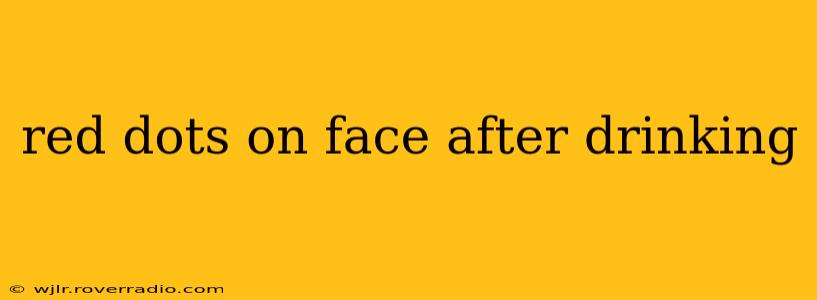Developing red dots on your face after drinking alcohol is a concerning issue that can have several underlying causes. While it might seem like a minor inconvenience, understanding the potential reasons behind this reaction is crucial for managing the problem and preventing future occurrences. This comprehensive guide delves into the various possibilities, offering insights into diagnosis, treatment, and preventative measures.
What Could Be Causing Red Dots on My Face After Drinking?
This symptom can manifest differently for different people, and the intensity of the reaction can vary. Several factors contribute to the appearance of these red dots, and accurate diagnosis is vital. Let's explore some of the most common culprits:
Alcohol Flush Reaction
This is arguably the most common reason. An alcohol flush reaction is characterized by the reddening of the face, neck, and even upper chest after alcohol consumption. It's caused by a genetic deficiency in the enzyme aldehyde dehydrogenase (ALDH2), which is responsible for breaking down acetaldehyde, a toxic byproduct of alcohol metabolism. The buildup of acetaldehyde leads to vasodilation (widening of blood vessels), resulting in the characteristic redness. In some cases, this vasodilation can present as small, noticeable red dots.
Allergic Reaction to Alcohol or Additives
While less frequent, an allergic reaction to alcohol itself or certain additives in alcoholic beverages is a possibility. This reaction can present as a rash, hives, or small red bumps, often accompanied by itching or swelling. The specific allergen varies, so identifying the culprit can be challenging.
Rosacea Flare-Up
Alcohol is a well-known trigger for rosacea, a chronic inflammatory skin condition. Rosacea causes redness, flushing, and visible blood vessels on the face. Alcohol consumption can exacerbate existing rosacea, leading to a noticeable flare-up presenting as red dots or patches.
Histamine Release
Alcohol can trigger the release of histamine, a compound involved in allergic and inflammatory responses. This histamine release can cause skin reactions, including the appearance of red dots or blotches.
Dehydration
Alcohol is a diuretic, meaning it increases urine production and can lead to dehydration. Dehydration can affect skin health, potentially making it more prone to irritation and inflammation, resulting in the appearance of red dots.
What Should I Do if I Get Red Dots After Drinking?
If you experience red dots on your face after consuming alcohol, several actions can help manage the situation:
- Hydrate: Drink plenty of water to counteract alcohol's diuretic effect and support healthy skin hydration.
- Cool Compress: Applying a cool compress to the affected area can help reduce redness and inflammation.
- Avoid Alcohol: The most effective solution is to avoid alcohol altogether, or at least significantly limit your intake, especially if you consistently experience this reaction.
- Consult a Doctor: If the reaction is severe, persistent, or accompanied by other symptoms (like itching, swelling, or difficulty breathing), seek medical attention immediately. A dermatologist or allergist can help determine the underlying cause and recommend appropriate treatment.
How Can I Prevent Red Dots from Appearing After Drinking?
Prevention is key. Here's what you can do:
- Limit Alcohol Intake: Moderate or avoid alcohol consumption to minimize the risk of a reaction.
- Choose Beverages Wisely: Opt for clear spirits (vodka, gin) which tend to contain fewer additives compared to other alcoholic beverages.
- Stay Hydrated: Maintain proper hydration levels throughout the day, especially if you plan to drink alcohol.
- Manage Underlying Conditions: If you have rosacea or other skin conditions, managing these effectively can help minimize alcohol-related flare-ups.
Are Red Dots After Drinking a Sign of Something Serious?
While often benign, persistent or severe reactions warrant medical attention. The red dots themselves may not indicate a serious underlying problem, but the underlying cause could be. Therefore, consulting a healthcare professional is important to rule out any serious condition.
This information is for educational purposes only and does not constitute medical advice. Always consult with a qualified healthcare professional for any health concerns or before making any decisions related to your health or treatment.
